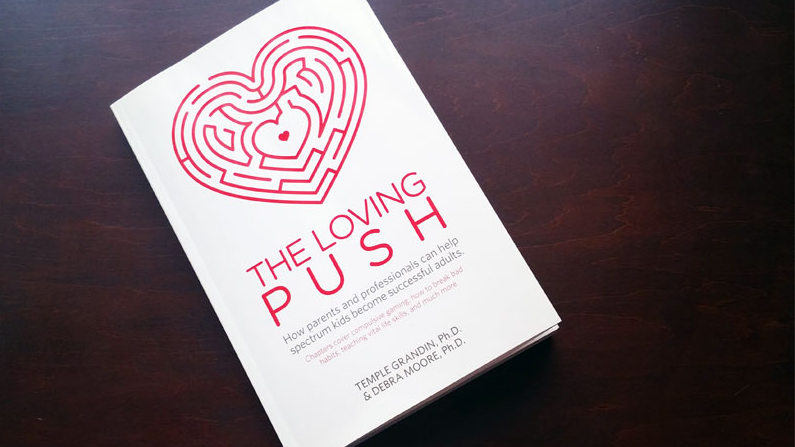
When you have a child, there’s something nobody tells you: suddenly your first priority becomes another person’s needs instead of your own, and this can take a lot of getting used to. Then comes the twist: as soon as you’ve adjusted to them being totally dependent on you, you have to start the impossibly difficult process of letting them go.
When you have an autistic child, the same rules apply, only everything is intensified. With your child’s additional needs comes an almost overwhelming desire to shield them from life’s more painful experiences, and since they’re developing at their own unique pace, it can be hard to know when they’re ready to take the next step.
Temple Grandin and Debra Moore explore this process in great detail in their book ‘The Loving Push’ and – unsurprisingly when you consider the title – recommend that you gently encourage your child to venture outside their comfort zone and experience more of what the world has to offer.
Temple herself was raised in the 1950’s, when children were routinely expected to learn manners, do household chores and master the employment skills they’d require later in life. Her concern is that many young autistic people are failing to reach their full potential because they’re not being taught to take this kind of basic responsibility for themselves, spending their time instead using social media or playing video games.
Obviously this doesn’t apply to every autistic person, but there are certainly many who do live this way, or are struggling in other areas because of a lack of self-confidence, and the book has been written to offer practical support and guidance for both parents and professionals who want to help them overcome their difficulties and enjoy success on their own terms.
The book offers several real-life examples of autistic adults discussing the challenges they faced when learning new skills, and how these have helped them navigate the outside world. With the ultimate goal being independent living for those who are able to achieve it, ‘The Loving Push’ has a whole variety of ideas to support them on the road to employment. Everything from finding positive role models and taking part in volunteer work, to using their passions to spark an interest in a potential career is discussed, as well as using their inherent skills (the ability to hyper focus, enjoying repetitive tasks etc.) to find the right role for them in the workplace.
Temple makes it very clear that any ‘learned helplessness’ can, and must, be overcome before you can make any real progress. If your child hasn’t tried to build their skillset – either because you’ve never expected them to, or because they’re afraid to – and they therefore believe they’re helpless even if they’re not, she recommends starting new routines at home to promote more positive habits: cooking, cleaning, good personal hygiene and so on. She discusses setting the pace that’s right for your child, finding the learning methods that suit them best, and staying strong when things get rocky.
Whatever your child’s ability, and whatever your ultimate goal, the tips on overcoming negative thinking and getting past the anxiety these new experiences will bring are definitely useful. Using creative thinking to open up new pathways for them, and helping them understand how failing in one area doesn’t automatically mean they’ll fail in another, are relevant subjects for anyone who’s supporting an autistic person.
The book goes on to look at what to do when things have got out of hand, and uses the example of compulsive gaming to highlight a whole variety of strategies you can use to initiate new and more positive patterns of behaviour. The subject is covered in great depth and if this isn’t something that’s affecting your life it can be easy to feel this part isn’t relevant, but stick with it, because there’s some very sound advice and some great techniques for breaking away from rigid thinking in this section.
The final chapters focus on getting your child ready for adulthood, and cover four main areas: learning domestic skills, driving or using public transport, learning about what’s involved in working for a living, and using social skills to connect with their community. Each subject is dealt with in a positive, proactive way, with plenty of suggestions and examples to encourage you when things get tough.
Overall I’d say this is an encouraging book which addresses some common challenges in an optimistic and hopeful way. Temple doesn’t pull her punches though, and while I can’t fault the advice given, the amount of energy some of these strategies require can come across as a bit unrealistic at times.
Speaking as an exhausted parent to four children on the spectrum, there were definitely times the book made me feel my parenting skills weren’t quite up to scratch, yet my children are all out there achieving more than I’ve ever dreamed possible. My advice then is to use its information wisely, in the way that works best for you, and refuse to give in to the inevitable parental guilt when you spot things your child hasn’t mastered yet.
In summary, The Loving Push is definitely worth reading, and the earlier you can put its advice into practice, the better. Just remember to keep an open mind about how it relates to your own situation, and always treat your child with the kindness and respect they deserve. Parts of the book can be quite alarming, and we all know how easy it is to panic about our children’s futures, so it’s important to stay relaxed when you’re using the techniques. By all means push your children to experience new things, but as Temple rightly points out: do it gently, and most importantly, do it with love.
![]()

